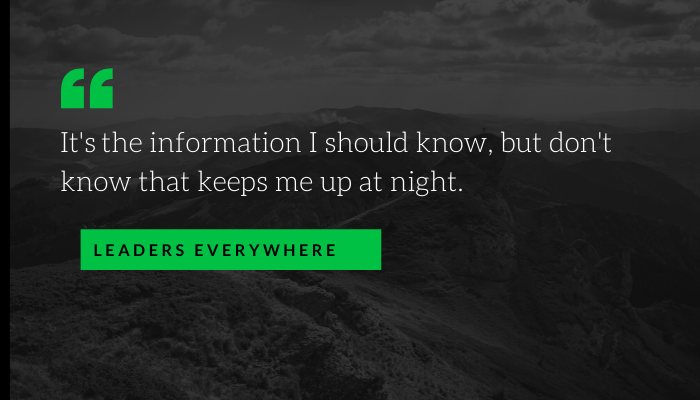“It’s the information I should know but don’t know that keeps me up at night”.
I cannot remember where I heard the quote, it could have been one a leader quoted in “Fearless Organizations” or in “Culture Code” or in any number of books I have read lately, but it resonated with me. As a board member, an advisor, as a Chair, as a parent – it is a sentence that should be top of mind for all leaders when thinking about the types of culture they wish to create in their organisation or the type of culture they already have in their organisation.
I was reminded of the statement when I read and shared an article this week by Amy C Edmondson. Amy is the Novartis Professor of Leadership and Management at Harvard Business School and the article which appeared in Harvard Business Review was titled “Don’t hide bad news in times of crisis” (article can be viewed here) https://hbr.org/2020/03/dont-hide-bad-news-in-times-of-crisis.
Amy wrote that “Hiding bad news is virtually a reflex in most organizations”, and it got me thinking. Our recent headlines outlining our inquiries, our royal commissions, our investigations into banking and finance, aged care, government, education, and religious institutions all have one thing in common – they made poor decisions at the expense of customers and our communities and at the expense of social responsibility. What I wonder is – did the board and decision makers have all the information they needed to make their decision? Are we making the right people accountable – how many board spills do you see over cultural issues? Are we really creating an environment which provides management with the opportunity to deliver bad news and problem solve instead of blame? What the hell is going on with our organisations that we seem to have a leadership crisis across the board?
Transparency is critical
As leaders and emerging leaders we state that transparency and authenticity is critical in leadership today. That accountability is trait of leadership which needs to be demonstrated. But if our leaders instinctive reaction is to hide bad news – what examples are we setting in our organisations and why are we making boards personally and collectively responsible for management decisions?
Or is it a case that if the fish rots from the head that this lack of transparency, accountability, culture is being set from the board?
Here’s what we know :
- Organisations serious about sustainable growth (competing in customer centricity or innovation) must encourage people to speak up honestly about the problems they see.
- Transparency simply will not happen without psychological safety: a climate in which people can raise questions, concerns, and ideas without fear of personal repercussion
- Being able to “speak up” is crucial as this is the key to sharing knowledge and promote teamwork.
The role of leadership
This is a discussion and responsibility for all levels of leadership – those in teams, those in management, those in executive positions and those on boards. Whilst the accountability may be different across leadership roles it is everyone’s responsibility to create a “speak up culture”. A dear friend of mine works for an organisation and is a “Green Light to Talk” advocate. An invitation only group of people who are advocates of employees of the organisation to “speak up” and report poor behaviour or discuss personal challenges.
It is agreed though, that our leaders at top are being watched carefully by those inside and outside the organisation and therefore have the greatest opportunity to demonstrate the appropriate behaviours and keep those within the organisation accountable to a set of behaviours that demonstrate the organisations values.
Changing the dialogue
It’s about learning from experiences and collectively problem solving to create solutions that are better for customers and employees. It’s about asking – what is one thing that would help you deliver a better service to our customers? It’s about asking for help when you need it. It’s about admitting fault and asking for assistance to get back on track. It’s about admitting that you don’t know but finding ways to find the answers. It’s about asking questions.
Risk averse
We are all risk averse and we will run from any suggestion of threat. Therefore if you wish for transparency , you need to create an environment of psychological safety. That is, an environment where people feel safe to ask questions, challenge the status quo, provide alternative ideas, without the threat of punishment, humiliation or a professional loss ie demotion.

